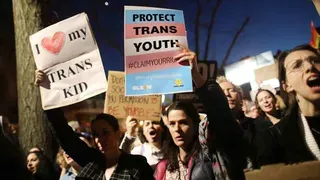April 11, 2013
Colorado Civil Unions Bill Will Boost Local Economy
Lindsay King- Miller READ TIME: 4 MIN.
On May 1, same-sex civil unions will become legal in Colorado. The return of the state House of Representatives to Democratic control in the 2012 elections cleared the way for the legalization of civil unions, which passed last month. The bill was signed by Governor Hickenlooper on Mar. 21, bringing to a close what many LGBT rights advocates saw as two disheartening years of ideological struggle and partisan maneuvering. Now, gay and lesbian couples will have the opportunity to avail themselves of many of the benefits of state-sanctioned marriage, from inheritance to visitation rights.
And along with the very real legal and financial benefits to creating a family recognized by the state, there's another perk almost as important to many same-sex couples: the wedding.
"People like to celebrate and mark milestones in their lives," said Lawrence French, proprietor of the gay-owned and operated Lifestyles Catering. "When two people have decided to commit themselves to each other, whether in a legal or spiritual way or just in a group of friends, it's only natural that they want to throw a party."
The legalization of civil unions is good news for same-sex couples, their allies and their families, but it's also good news for the wedding industry and the Colorado economy in general. A 2011 study by the Williams Institute at UCLA predicted that, in the three years following legalization of civil unions, same-sex couples in Colorado will spend nearly $19 million on weddings and other civil union ceremonies. They predict an additional $6 million in spending by out-of-state same-sex couples holding destination weddings in Colorado. Based on these estimates, same-sex weddings will generate nearly $726,000 in additional sales tax revenue for the state over the next three years.
Of course, weddings for same-sex couples have not been uncommon, even before such a relationship had any legal standing. "Lifestyles has been in existence since 1995, and we've never turned anyone away," said French.
Rev. Kristen Hepp, proprietor of Colorado Commitments, said "I have been performing commitment ceremonies along the lines of a civil union for years. People want to profess their love in front of their family and friends."
But the establishment of a legally recognized union between same-sex partners will make the prospect of a wedding much more appealing to many couples. Predicting an increase in Colorado weddings after May 1, Tim Gaudette, Chair of the Denver Gay and Lesbian Chamber of Commerce, said, "As a community, I think there will be pent up demand for those couples waiting for a time like this. We all grew up in families and going to weddings was part of everyone's experience. So it is not too far to stretch to conceive that our community will want to share the ability to celebrate our relationships, much like anyone else would or has for so many years."
Hepp agreed: "So many couples wish they could have something legal. I know many people who have been waiting for this to happen. Of course that will have an economic impact -- gay people have money like everyone else."
On May 4, three days after civil unions become legal, Hepp plans to offer free civil union solemnizations to any couple with a license, gay or straight, from 10 a.m. to 3 p.m. in Boulder's Chautauqua Park.
"Gay people have always been the bridesmaid, and never the bride," said French. "We have straight friends, and we go to their weddings. We celebrate, we toast them, we wish them happiness and blow bubbles, but when we find that person who just happens to be the same sex, we want to be able to celebrate too. Here in Colorado is a fantastic destination wedding spot, and if we could reap the benefits of that, it would be fantastic for the local economy."
Sales tax revenue from wedding ceremonies is not the only contribution civil unions will make to Colorado's economy. The Williams Institute study also found that fees for civil union licenses -- equal to the cost of a marriage license -- will generate $180,600 in revenue over a three-year period. Additionally, the study found that civil unions would save the state substantial expenditures on public assistance programs.
The income of same-sex partners in a civil union will be considered in determining an individual's eligibility for such benefits, in the same way that a spouse's income is currently taken into account. As a result, fewer people will be eligible for means-tested public assistance. The Williams Institute estimated that Colorado will save $4.8 million dollars on public benefits in the three years following legalization of civil unions.
Ultimately, however, advocates like French and Hepp argue that offering civil unions to same-sex couples is not just about economics; it's about equality.
"As more people come out and as more same-sex weddings happen," said French, "it's not going to be something that's strange and different, it's going to be just the norm. I really look forward to seeing people taking the idea of bonding with one another to a different level."







